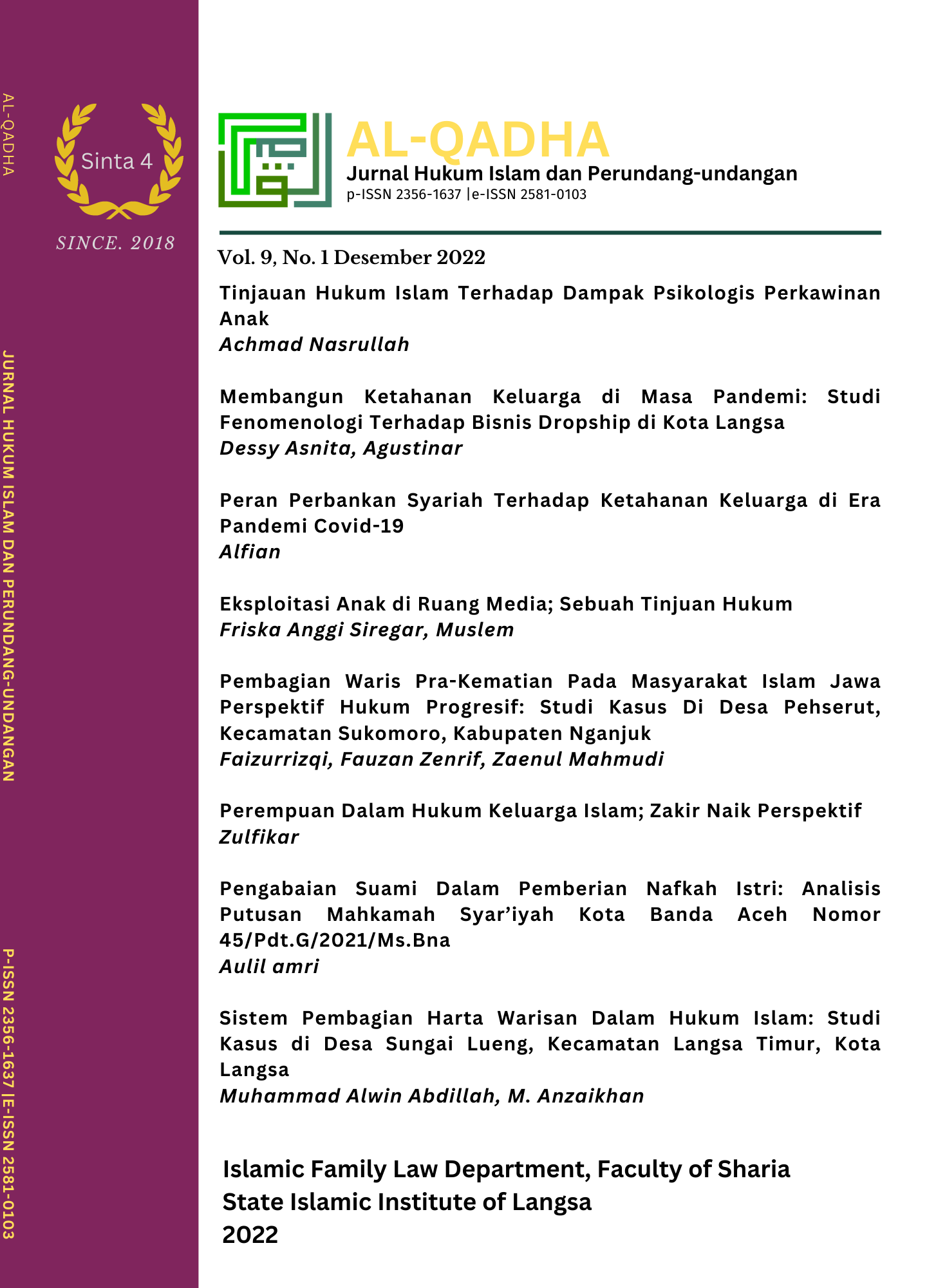Main Article Content
Abstract
The family becomes important in the defense and protection of its members. For this reason, it is necessary to ensure that every family has good capital in order to be able to face various difficult and challenging life situations. This study aims to determine family resilience during a pandemic, as well as factors that support and hinder the resilience of the family by using family demographic groups, namely family type, parental occupation, and residential area. The approach used in this research is descriptive qualitative used with research subjects totaling 100 people. The results of the study show that the economic resilience of the family during the Covid-19 pandemic has decreased, especially in terms of income and ability to meet family needs. However, from the aspect of housing ownership, financing for children's education, and family financial security, the economic resilience of the family in Indonesia can be considered quite good. This study recommends the need for a fairly good family financial management strategy. Family resilience in this study was measured using the Walsh Family Resilience Questionnaire developed by Walsh (2012) and analyzed using descriptive statistical analysis techniques.
Keywords
Article Details
References
- Achidsti, Ashilly, Muhammad Zidny Kafa, dan Ahmad Mizdad Hudani. “Tata Kelola Pendataan dan Penyaluran BLT-DD Melalui Pasardesa.id sebagai Upaya Pencegahan Korupsi.” Integritas : Jurnal Antikorupsi 6, no. 2 (2020): 313–26. doi:10.32697/integritas.v6i2.681.
- Ariyanti, Farhad Ghafouri Kesbi, Ali Rafiei Tari, Gunaria Siagian, Siti Jamilatun, Fernando G. Barroso, María José Sánchez-Muros, et al. “No Titleการวิจัยเบื้องต้น.” Jurnal Aplikasi Teknologi Pangan 4, no. 1 (2021): 1–2. http://www.ejurnal.its.ac.id/index.php/sains_seni/article/view/10544%0Ahttps://scholar.google.com/scholar?hl=en&as_sdt=0%2C5&q=tawuran+antar+pelajar&btnG=%0Ahttps://doi.org/10.1016/j.jfca.2019.103237.
- Maiti, dan Bidinger. “Ketahanan Ekonomi Keluarga di Depok terhadap Pegawai di Depok.” Journal of Chemical Information and Modeling 53, no. 9 (1981): 1689–99.
- Rahmansyah, Wildan, Resi Ariyasa Qadri, RTS Ressa Anggia Sakti, dan Syaiful Ikhsan. “Pemetaan Permasalahan Penyaluran Bantuan Sosial Untuk Penanganan Covid-19 Di Indonesia.” Jurnal Pajak dan Keuangan Negara (PKN) 2, no. 1 (2020): 90–102. doi:10.31092/jpkn.v2i1.995.
- Ramadhana, Maulana Rezi. “Mempersiapkan Ketahanan Keluarga Selama Adaptasi Kebiasaan Baru Di Masa Pandemi Covid-19.” Jurnal Kependudukan Indonesia 2902 (2020): 61. doi:10.14203/jki.v0i0.572.
- Resilience, Ketahanan, Keluarga Di, dan Masa Pandemi. “Walsh family resilience ,” 2020.
- Roma Megawanty; Margaretha Hanita. “Ketahanan Keluarga Dalam Adaptasi New Normal Pandemi Covid- 19 Di Indonesia.” Jurnal Kajian Lembaga KetahananNasional Republik Indonesia 9, no. 1 (2020): 491–504. http://jurnal.lemhannas.go.id/index.php/jkl/article/view/204/113.
- Roni, Muhammad, dan M. Anzaikhan. “Pembentukan Keluarga Shaleh Dalam Komunikasi Islam: Studi Komparasi Penafsiran Al-Qur’an.” AL-HIKMAH: Media Dakwah, Komunikasi, Sosial dan Budaya 12, no. 1 (2021): 51–61. doi:10.32505/hikmah.v12i1.2825.
- Roni, Muhammad, M. Anzaikhan, dan Ismail Fahmi Arrauf Nasution. “Dinamika Sosial dalam Pandangan Al-Qur’an: Analisis Penafsiran Term Al-ibtilâ’.” Substantia: Jurnal Ilmu-Ilmu Ushuluddin 23, no. 2 (2021): 136. doi:10.22373/substantia.v23i2.9475.
- Roni, Muhammad, dan Ismail Fahmi Arrauf Nasution. “The Legality Of Miras (Khamr) in Al-Quran Persfective (Comparative Study of The Tafsir Al-Maraghy, Al-Misbah, and Al-Qurthubi).” FITRAH: Jurnal Kajian Ilmu-ilmu Keislaman 7, no. 1 (2021): 81–98. doi:10.24952/fitrah.v7i1.3685.
- Santi Deliani Rahmawati, Halimatus Saidah. ” 3, no. 2017 (2020): 54–67. http://repositorio.unan.edu.ni/2986/1/5624.pdf.
- Sari, Lina Maya, Lukuk Musfiroh, dan Ambarwati. “Restrukturisasi Kredit Bank Daerah X Pada Masa Pademi Covid-19.” Jurnal Mutiara Madani 08, no. 1 (2020): 46–57.
- Satradinata, Dhevi Nayasari, dan Bambang Eko Muljono. “Analisis Hukum Relaksasi Kreadit Saat Pandemi Corona Dengan Kelonggaran Kredit Berdasarkan Peraturan Otoritas Jasa Keuangan Nomor 11/POJK.03/2020.” Jurnal Sains Sosio Humaniora 4, no. 2 (2020): 613–20. doi:10.22437/jssh.v4i2.11009.
- Suari, Ni Made Kitty Putri; Giri, Ni Putu Niti Suari. “Analisis Terhadap Potensi Maladministrasi Bantuan Langsung Tunai (BLT) Dana Desa Selama Pandemi Covid-19.” Jurnal Kertha Negara 9, no. 2 (2021): 107–19.
- Sukerta, I Made Rai, I Nyoman Putu Budiartha, dan Desak Gde Dwi Arini. “Restrukturisasi Kredit terhadap Debitur Akibat Wanprestasi Karena Dampak Pandemi Covid-19.” Jurnal Preferensi Hukum 2, no. 2 (2021): 326–31. doi:10.22225/jph.2.2.3329.326-331.
- Tahliani, H. “Tantangan Perbankan Syariah dalam Menghadapi Pandemi Covid-19.” Madani Syari’ah 3, no. 2 (2020): 92–113. https://stai-binamadani.e-journal.id/Madanisyariah/article/view/205.
- Zakiyah, Ni’matus, Liana OKtavia, Fatkhul Khairiyah, dan Muhammad Afthon Ilman. “Efektivitas Pelaksanaan Bantuan Sosial Dari Pemerintah Terhadap Masyarakat Terdampak Covid-19 Di Desa Gendongarum Kecamatan Kanor Kabupaten Bojonegoro.” Spirit Publik: Jurnal Administrasi Publik 15, no. 2 (2020): 97. doi:10.20961/sp.v15i2.43501.
- Zuhra, Fatimah. “Membangun Ketahanan Keluarga di Masa Pandemi.” The Aceh Institute 10 (2020): 6. https://acehinstitute.org/mahasiswa-menulis/membangun-ketahanan-keluarga-di-masa-pandemi.html.
